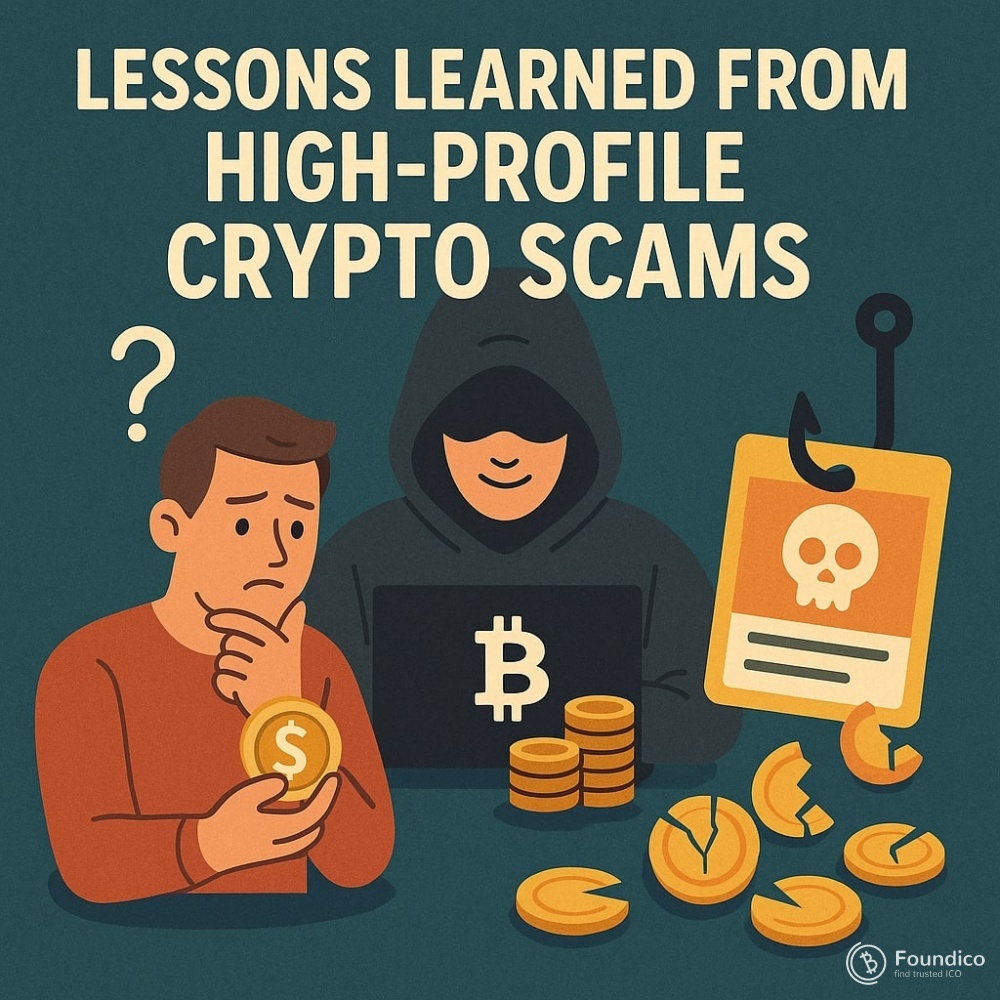Lessons Learned from High-Profile Crypto Scams

By Dr. Pooyan Ghamari, Swiss Economist and Visionary
The rapid ascent of cryptocurrencies has ushered in a new era of financial innovation and opportunity. Yet, amid this transformation, the crypto space has also become a playground for fraudsters and scammers who exploit both the novelty of the technology and the enthusiasm of investors. High-profile crypto scams have not only resulted in billions of dollars in losses but have also threatened the credibility and long-term viability of the entire industry.
Drawing on my expertise as a Swiss economist deeply involved in financial ecosystems and my vision for a sustainable digital economy, this article explores critical lessons learned from some of the most notorious crypto scams to date. These insights aim to guide investors, regulators, and innovators toward building a safer and more resilient crypto future.
The Anatomy of High-Profile Crypto Scams
High-profile crypto scams tend to share several common characteristics:
-
Promising Unrealistic Returns: Perpetrators often lure victims by guaranteeing extraordinarily high profits with little or no risk.
-
Complex or Opaque Structures: Scams often use complicated jargon, fake technology claims, or unclear business models to confuse and mislead investors.
-
Aggressive Marketing Tactics: Leveraging social media influencers, celebrity endorsements, and viral campaigns to rapidly expand their reach.
-
Exploiting Regulatory Gaps: Many operate across multiple jurisdictions, capitalizing on inconsistent regulations and enforcement challenges.
Notable examples include fraudulent Initial Coin Offerings (ICOs), Ponzi schemes disguised as investment platforms, and deceptive token projects with no real utility.
Lesson 1: Due Diligence is Non-Negotiable
The foundation of any wise investment is rigorous due diligence. Investors must go beyond glossy marketing materials and ask probing questions:
-
Who are the founders, and what is their track record?
-
Is the project’s technology verifiable and open to inspection?
-
Are financials and audits transparent and trustworthy?
-
What legal and regulatory protections are in place?
Blind trust, especially in fast-moving markets, is a recipe for disaster.
Lesson 2: Transparency Builds Trust — Lack of It Breeds Suspicion
Transparency should be a cornerstone of any legitimate crypto venture. Open-source code, verifiable smart contracts, clear whitepapers, and regular third-party audits can provide assurance to investors.
High-profile scams often shun transparency, opting instead for secrecy and evasiveness — red flags that must not be ignored.
Lesson 3: Regulation is Both Inevitable and Essential
While cryptocurrency advocates cherish decentralization, the absence of regulatory oversight creates fertile ground for scams. High-profile frauds highlight the urgent need for thoughtful regulation that balances protection with innovation.
International cooperation is crucial since many scams cross borders effortlessly, making unilateral efforts ineffective. Regulatory clarity also encourages reputable projects to flourish by establishing clear compliance standards.
Lesson 4: Investor Education Empowers Protection
Many victims of crypto scams are everyday investors drawn by the promise of quick riches. Educating the public about the risks, warning signs, and proper evaluation methods is critical.
Empowered investors can recognize suspicious schemes early and avoid falling prey to scams, reducing the damage these bad actors can cause.
Lesson 5: Technology Can Be a Double-Edged Sword
Blockchain’s transparency and immutability can help detect fraud but also create new vectors for sophisticated scams. Conversely, artificial intelligence and advanced analytics now provide powerful tools for early detection of irregular patterns.
The future of crypto security lies in harnessing technology wisely — to protect investors while maintaining the decentralized ethos of the space.
Lesson 6: Community Vigilance is Vital
The crypto community itself plays a key role in identifying and exposing scams. Whistleblowers, ethical hackers, and watchdog groups have repeatedly been instrumental in bringing fraudulent schemes to light before they escalate.
Encouraging a culture of vigilance, openness, and accountability strengthens the ecosystem and protects its participants.
Towards a Safer Crypto Future
High-profile crypto scams serve as painful but invaluable lessons. They expose vulnerabilities not only in technology but also in human behavior, regulatory frameworks, and market dynamics.
By embracing due diligence, transparency, regulation, education, and technological innovation, we can collectively build a crypto landscape that lives up to its promise — democratizing finance while minimizing risks.
As a Swiss economist and visionary, I see these lessons as stepping stones toward a mature, trustworthy, and inclusive digital economy. The path forward demands collaboration among investors, regulators, technologists, and communities alike — ensuring that crypto’s transformative power benefits all, rather than a deceptive few.
Dr. Pooyan Ghamari is a Swiss economist specializing in financial systems, digital currencies, and global economic trends. He is known for advocating balanced innovation coupled with rigorous safeguards in emerging markets.
